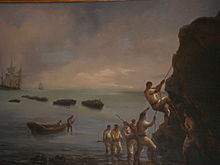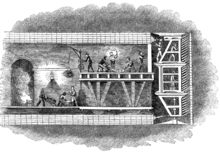Thomas Cochrane, 10th Earl of Dundonald
Thomas Cochrane, 10th Earl of Dundonald GCB (pronounced kóckrann; born December 14, 1775 in Annesfield , Lanarkshire , † October 31, 1860 in Kensington ) was a British naval hero , politician , freedom fighter and inventor .
Thomas Cochrane is a role model for the literary character Jack Aubrey in the novels of Patrick O'Brian and partly also for Horatio Hornblower of CS Forester .
Youth and family
Cochrane was the eldest son of Archibald Cochrane, known as a chemist , 9th Earl of Dundonald , and was raised by his uncle, Admiral Sir Alexander Cochrane , who took and ravaged Washington DC in 1814 . He had six brothers. The family was not wealthy, so in 1793 the family's ancestral home had to be sold to meet existing liabilities.
Cochrane joined the Royal Navy in 1793 . In 1795 he was promoted to serving lieutenant and confirmed in that rank the following year after he had passed the exam. During this time he made himself an enemy to John Jervis, 1st Earl of St. Vincent , who was then First Lord of the Admiralty .
During the Napoleonic Wars , Cochrane distinguished himself as a brave and successful leader of small to medium-sized combat ships.

With his brig - sloop HMS Speedy , he disrupted trade on the Mediterranean coast in 1800 by capturing more than 50 ships so persistently that the Spanish government opened the El Gamo Schebecke (32 cannons: 8 eight-pounders, 22 12-pounders and two carronades , 319 men crew) to field the Speedy . Cochrane succeeded with his much smaller and less armed Speedy (14 4-pounders, 96 men crew, at the time of the battle: 54 men) to board and conquer the El Gamo on May 6, 1801.
After 15 months of pirate voyage, Cochrane was captured after a battle against three French ships of the line by the French Admiral Linois on July 3, 1801, but after a short time exchanged for other prisoners in connection with the First Sea Battle of Algeciras . In August 1801 he was appointed full captain. After Jervis was removed from office, Cochrane et al. a. the frigates HMS Pallas and HMS Imperieuse very successfully.
On April 11, 1809, under Admiral James Gambier , he led a British fire attack against a French fleet off Rochefort and drove the majority of the ships of the line to beach. Since Admiral Gambier refused to continue the attack and completely destroy the French fleet after this unexpectedly successful advance, Cochrane criticized him so massively that the latter filed a court martial against himself in order to restore his reputation. Because of his opposition to Admiral Gambier and the government, Cochrane lost his command.
Politician
Cochrane became a member of the British House of Commons for the boroughs Honiton (1806-1807) and Westminster (1807-1818). He campaigned for parliamentary reform, allied with radicals like William Cobbett and Henry Hunt against the policies of Lord Castlereaghs . Through his sharp criticism of warfare and corruption in the navy and waste of taxpayers' money by Parliament, he created many influential enemies in the government and the Admiralty .
He was the first to campaign for the humane treatment of prisoners of war.
Cochrane was charged in connection with the stock market fraud of 1814: A distant acquaintance of Cochrane disguised as a messenger from France brought the false news in 1814 that Napoleon I had been killed by Cossacks and that Paris was about to be occupied by Russian and Prussian troops. Cochrane's relatives made hundreds of thousands of pounds in the chaos on the London Stock Exchange. Although Cochrane was most likely innocent, he was sentenced to pillory and one year in prison, and dishonorably discharged from the Navy and Parliament. In 1809 he was awarded the Knight Companion of the Bath Order and was stripped of him.
This treatment of the sea hero attracted a great deal of public attention and Cochrane was re-elected as a member of parliament immediately after the verdict. Popular anger resulted in Cochrane being pardoned from pillory and prison terms. Since then, no one in Britain has been pilloried.
Freedom fighter
Cochrane left the United Kingdom in 1817 to command the fleets of Chile (1817-1822), Brazil (1823-1825) and Greece (1827-1828) during the Wars of Independence .
Under the orders of Bernardo O'Higgins, Cochrane restructured the small Chilean fleet as Vice Admiral and led a successful battle against Spanish ships and settlements on the coast with his frigate O'Higgins . He planned and commanded the conquest of Valdivia . Towards the end of the war he was used in the expedition from Peru to prepare for the liberation of Peru .
Brazil had already successfully declared itself independent from the Portuguese mainland, but Portuguese troops were still standing in the north when Cochrane took command of the Brazilian fleet . He bluffed the Portuguese troops stationed in Bahia to evacuate to Maranhão , and on that occasion took possession of most of the evacuation fleet. Then he sailed quickly to Maranhão and persuaded the garrison there to surrender in the face of the hopeless situation. The same bluff succeeded one of his subordinates with the occupation of the city of Pará . So Cochrane conquered the north of Brazil, the last part of the country that was still under the rule of the motherland.
Cochrane was in 1825 by Emperor Dom Pedro I to the Marquis of Maranhao collected.
From 1827 he fought for Greece as commander in chief of the national naval forces . Cochrane suppressed piracy in Greek waters, but lost reputation and influence through his arbitrary behavior, so that he returned to England in early 1828 without having received a vacation from the Greek government.
Complete rehabilitation
In 1828 Cochrane returned to Great Britain and fought for his rehabilitation . In 1832 he was pardoned and reassigned to the Navy with the rank of rear admiral , after he had inherited the title of Earl of Dundonald through the death of his father a year earlier and received the favor of Williams IV . Cochrane became Vice Admiral and Commander-in-Chief of the British Navy in North America and the West Indies in 1842, and then Admiral in 1851 . In 1847 he was reassigned to the Bath Order as the Knight Grand Cross .
Most recently he wrote his autobiography . Cochrane died in 1860 and was buried in Westminster Abbey .
inventor
Cochrane invented improvements to gas lights, ship lights, and steam generators, and in 1812 proposed the use of smoke candles and poison gas in the face of Napoleon's threat to England . The proposal to use poison gas was kept top secret by the British government until 1895 because the terrible effects were foreseen.
Inspired by the approach taken by the shipworm , Cochrane and engineer Marc Isambard Brunel developed the tunnel drilling shield in 1818 , which was used for the construction of the Thames Tunnel in London.
Cochrane was an early proponent of steamboats . While preparing for his mission in Chile, he tried to create a steamship from England to Chile, but it only arrived there after the war was over. The steamships that he sent to Greece also came too late. From 1830 he experimented with steam himself and developed a steam turbine to drive a ship. In 1851, Cochrane received a patent for propelling steamships by burning bitumen . At the time, Cochrane's father had received a patent for the use of bitumen to protect the ship's hull from shipworms.
Honors
A city , a river and a lake were named after Cochrane in Chile .
The Chilean Navy has so far named four ships Almirante Cochrane :
- an armored frigate, which was successfully used in the saltpeter war (1879-1884), u. a. in the naval battle of Angamos
- from 1962 a Fletcher-class destroyer (originally USS Rooks );
- from 1984 a County-class destroyer (originally HMS Antrim );
- from 2006 a type 23 frigate (originally HMS Norfolk ).
Another battleship to bear this name was bought by Great Britain in 1918 and completed as the aircraft carrier Eagle .
The British Royal Navy named two ships and a naval base on land after him:
- HMS Cochrane (1905) was a Duke of Edinburgh- class armored cruiser launched in 1905 and scrapped after being stranded in 1918.
- HMS Cochrane (1914) was a depot ship, entered service in 1914 as an auxiliary cruiser and acquired in 1915 as HMS Ambrose (1914). It was renamed HMS Cochrane in 1938 and scrapped in 1946.
- Naval base HMS Cochrane was the name of the base in Rosyth since 1938. Several subsidiary bases also bore the name.
Works
- The autobiography of a seaman . Chatham, London 2000, ISBN 1-86176-156-2 (repr. Of Aug. London 1860).
- Notes on the mineralogy, government and condition of the British West-Indian islands . Ridgway, London 1851.
- Narrative of services in the liberation of Chile, Peru and Brazil . Ridgway London 1860 (2 vols.).
literature
- Joseph Allen: The life of the Earl of Dundonald, GCB Routledge, Warne, & Routledge, London 1861.
- David Cordingly, Cochrane the dauntless, The life and adventures of Thomas Cochrane , Bloomsbury Publishing, London, New York and Berlin 2008, ISBN 978-0-7475-8545-9 .
- Ian Grimble: The Sea Wolf. The life of Admiral Cochrane . Birlinn, Edinburgh 2001, ISBN 1-84341-007-9 .
- Wolfgang Mayer: The rebel Thomas Cochrane. Seeheld, radical, revolutionary 1775–1860 . Idea Verlag, Puchheim 1980, ISBN 3-9800371-5-0 .
- Brian Vale: The audacious Admiral Cochrane. The true life of a naval legend . Conway Maritime Press, London 2004. ISBN 0-85177-986-7 .
Web links
- Gazeteer for Scotland - Thomas Cochrane
- Napoleonic Guide - Thomas Cochrane
- Project Gutenberg: Continuation of Cochrane's autobiography by his son, Volume 1 (covers the years 1814–1827) , Volume 2 (1827–1860)
- Project Gutenberg: Description of the Wars of Liberation in Chile, Peru and Brazil, Volume 1 ; Volume 2
| predecessor | Office | successor |
|---|---|---|
| New title created |
Marquis de Maranhão 1825-1860 |
Title expired |
| Archibald Cochrane |
Earl of Dundonald 1831-1860 |
Thomas Cochrane |
| personal data | |
|---|---|
| SURNAME | Cochrane, Thomas, 10th Earl of Dundonald |
| ALTERNATIVE NAMES | Dundonald, Thomas Cochrane, 10th Earl of |
| BRIEF DESCRIPTION | British naval hero, politician, freedom fighter and inventor |
| DATE OF BIRTH | December 14, 1775 |
| PLACE OF BIRTH | Annesfield , Lanarkshire |
| DATE OF DEATH | October 31, 1860 |
| Place of death | Kensington |


